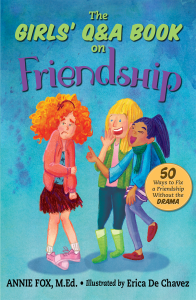|
|
December 10, 2014
 I’m Annie Fox and I approve this message! I read lots of parenting books, but only recommend the top notch. That means they deliver pragmatic advice in small, well-organized, chunks of digestible wisdom. No big chunks, please. Who’s got the time? It helps a lot if the book’s tone is so engaging I can imagine the author talking to me over a cup of coffee. Also, it’s a good thing if the descriptions of parent-child interactions are so spot-on I’m chuckling and misting over throughout. (Yes, a good parenting book is as likely to make me cry as it is to have me laughing and calling out to David, “Sweetie, you’ve gotta hear this!”) Added requirement for any great parenting book: I have to learn something new. Not so easy because, as I said, I read loads of them.
For all the above reasons, I’m happy to recommend Dr. Deborah Gilboa’s latest book, Get the Behavior You Want Without Being the Parent You Hate. Before I tell you what I learned, let me tell you who needs this book – Any parent who has ever wondered if there’s a better way to get your child to:
1. Brush his/her teeth
2. Get along better with siblings
3. Quit whining about being “booooorrrrreeeed” and learn to manage their free time creatively
4. Do something you require without your constant nagging
… plus fifty other things that kids need to learn in order to be become respectful, responsible, and resilient young adults.
Dr. Gilboa, aka @AskDocG, is a practicing family physician, and a parenting expert. She’s also the mom of four boys who, have apparently brought her to edge of sanity more than once. In the book’s introduction she admits that she has “nagged, yelled at, threatened, and guilted my children to try to get them to behave well. Not all of the time, and usually not on purpose, but, just like many parents, I’ve done all this and more. Not only do I feel really horrible about it afterwards, but (and here is the kicker) it doesn’t work.” So you see, Doc G is also honest, humble and funny. What’s not to like?
Listen to my podcast interview with Doc G.
As for what I learned from Get the Behavior You Want… it came from section 5: What you do is more important than what you feel. Think about it for a minute. Most of the time we mindful parents do our best to get our children in touch with their feelings. “How do you feel now, sweetheart?” “And how did what he said this morning make you feel?” “How do you think you’ll feel about that tomorrow?” The message to kids: how they feel is pretty much the most important thing. Doc G points out that feelings are important, but they should not be accepted as an excuse for poor behavior. Something parents do all the time!
We do it when we say, “Oh, she’s just in a bad mood.” “He’s had a hard day.” “She’s overtired.” Doc G teaches that we need to help our kids become accountable for their behavior. And we can accomplish that by empathizing with our kids’ feelings (“I understand why that made you angry….”) while still sticking with our standards of behavior (“….but biting is totally unacceptable in this family. And here’s the consequence for the doing it…”)
It’s not always easy for an unhappy, overtired child to accept responsibility for his or her actions, but parenting is all about clear standards and consistent responses, isn’t it?
Thanks, Doc G!
Try making this shift in the way you deal with unacceptable behavior from your kids and let me know how it goes.

November 24, 2014
Conventional Wisdom: Girls are more talkative than boys, especially when it comes to expressing their feelings.
Annie: That depends on the risk the girl believes she’s taking by being honest.
This question comes from Tweenhood.ca, a thoughtful, complete resource for parents of tweens. Co-fouder Wendy Morrelli, was kind enough to host a stop on my Girls’ Q&A Book on Friendship blog tour last month.
Q: I’ve heard my friend say and do things that are not nice. But I’m afraid to say something as I don’t want to lose her friendship.
 “I want to talk to her but I’m scared!” Illustration by Erica De Chavez from The Girls’ Q&A Book on Friendship by Annie Fox © 2014 Annie: Here’s what I hear you saying, “I don’t like the way she’s acting. I want it to stop. But I don’t want her to be mad at me. So I don’t know what to do!” I’ve heard this same fear expressed by many girls, so you’re certainly not alone!
When we are uncomfortable in a friendship because a friend is doing or saying something rude or disrespectful (to us or other people) we need to speak up. If you don’t tell her how her behavior makes you feel, she won’t know because she isn’t a mind-reader! But it’s hard to tell a friend that you don’t like what she’s doing. Maybe you’re afraid she will get angry and not want to be your friend any more. Maybe you also believe being a “good” friend means you should never say anything negative about your friend’s behavior. Where does that leave you? I’m guessing it probably leaves you feeling stuck. But you aren’t stuck. You always have options. You can stay silent, but I wouldn’t recommend it. Do you know why? Because when things aren’t going well in a friendship, silence does not make things better. Silence usually makes things stay the same or actually make things worse! If you are looking for ways to make things better between you and your friend, I suggest you take some slow deep breaths and say calmly and respectfully say this to her: “When you do ________ it makes me uncomfortable. It makes me lose respect for you. Please stop doing that.” Then close your mouth and listen to what she has to say. It could be a really interesting conversation! Read the rest of our Q&A at Tweenhood.
Bonus Question for Parents: How could you do a better job empowering your daughter to speak up in a friendship?

November 3, 2014
To tell the truth, I don’t remember how I met Vicky Thornton and Jen Rehberger. We probably connected on Twitter, as so many do. But I totally remember each of my visits to their podcast What Really Matters? where we always get real about 21st century parenting challenges, swap personal parenting stories, and laugh… a lot. I’m a big fan of their work and was delighted when Vicky and Jen each took the time to review The Girls’ Q&A Book on Friendship: 50 ways to fix a friendship without the DRAMA. They were also kind enough to interview me for their show (to be posted soon). And if that weren’t support enough, they are hosting today’s stop on my blog tour.
Here’s one of the tricky questions Vicky and Jen asked me for the tour.
 I’m missing out on… everything!! Question: My parents won’t let me have a phone yet and I am the only one of my friends without one. They are texting to each other all the time and I am left out. I really want one, but I will not be able to get one until next year. How can I still be a part of the group if I don’t know what they are always texting about?
Annie: This is a tough one. Your friends are communicating through their phones. Each time they do, they share information and feelings that bring them closer to each other. I understand why you feel left out. Do you understand why your parents won’t get you a phone until next year? If you aren’t clear about their reasons for waiting, please talk to them. Find out why they don’t think you are ready yet. And during that conversation, hopefully you will have the opportunity to tell them (calmly and maturely) why you believe you are ready to have a phone and to use it responsibly. This conversation may not change your parents’ feelings about getting a phone, but at least you will understand where they are coming from and they will understand where you are coming from.
As for feeling closer to your “always texting” friends… talk to them about it. You might say something like this “You guys are always texting. I feel left out. How would you feel about putting down the phones when I’m around?” Then close your mouth and listen to what they say. Real friends want to make each other feel included… not left out. If your friends aren’t willing to make you feel more included, what might that tell you about the kind of friends they are? Something to think about!
Read the rest of Vicky and Jen’s girl friendship questions and my answers here.

October 25, 2014
This question was asked of me on my current Girls’ Q&A Book blog tour, by Deborah McNelis, educator and founder of Brain InSights.
Deborah: Is there an aspect of friendships that you find to be most common from girls?
Annie: Yes! A common thread weaves its way through most girl friendship conflicts and makes girls feel trapped in uncomfortable peer relationships. It’s a misconception many girls have about their role in a friendship– a bizarre assumption that: “If I speak up for myself in a friendship, I am not being a good friend.” This creates huge problems for girls because when they are upset, they need to express themselves effectively and appropriately to their friend. (Talking behind her back doesn’t count as effective communication!)
Because girls are often unwilling and/or unable to initiate those necessary conversations, they feel miserable and complete stuck in their misery. They believe a “good friend” should never tell a friend something negative because then she will hurt the friend’s feelings. And that’s mean. So, if I, Annie, am hurt by something my bff Deborah did, I can not tell her, otherwise I will not be a good friend. But Deborah is not a mind reader. If I stay silent, Deborah has no way of knowing how I feel. My silence will, in fact, send the message that it is OK for her to continue treating me badly, even though it is not OK! My silence also leaves me feeling upset and powerless, not realizing that I do have power to change my response to this situation.
There is no girls’ friendship drama that can’t be made WORSE… through staying silent, venting behind a friend’s back, or pretending things are just peachy. Since we’re here to help girls make things better, one way is to give them opportunities to talk things through with us parents and teachers. Another is to do actual role play with them to boost their confidence in having these honest conversations. And finally, it’s our job to help them realize that they are never without options for feeling better about themselves in any relationship.
Every Friday at #GirlDramaChat we discuss girls’ friendship challenges and smart strategies for teaching them compassion, respect, and social courage. Follow me @GirlDramaChat for updates.
 50 Ways to Fix a Friendship without the DRAMA
 — Older Posts »
| |















